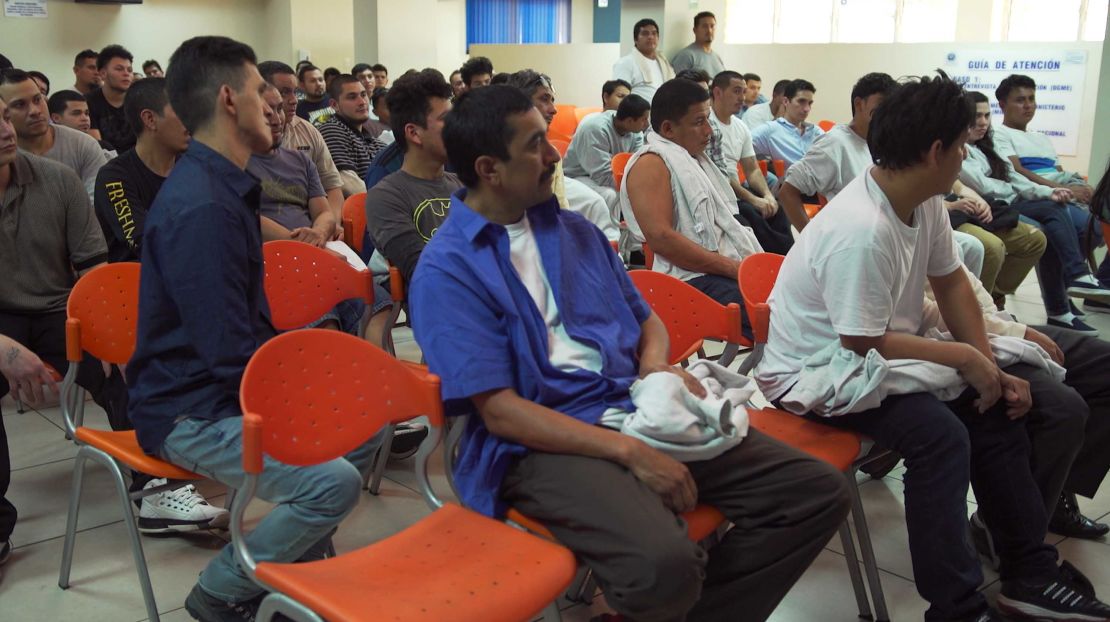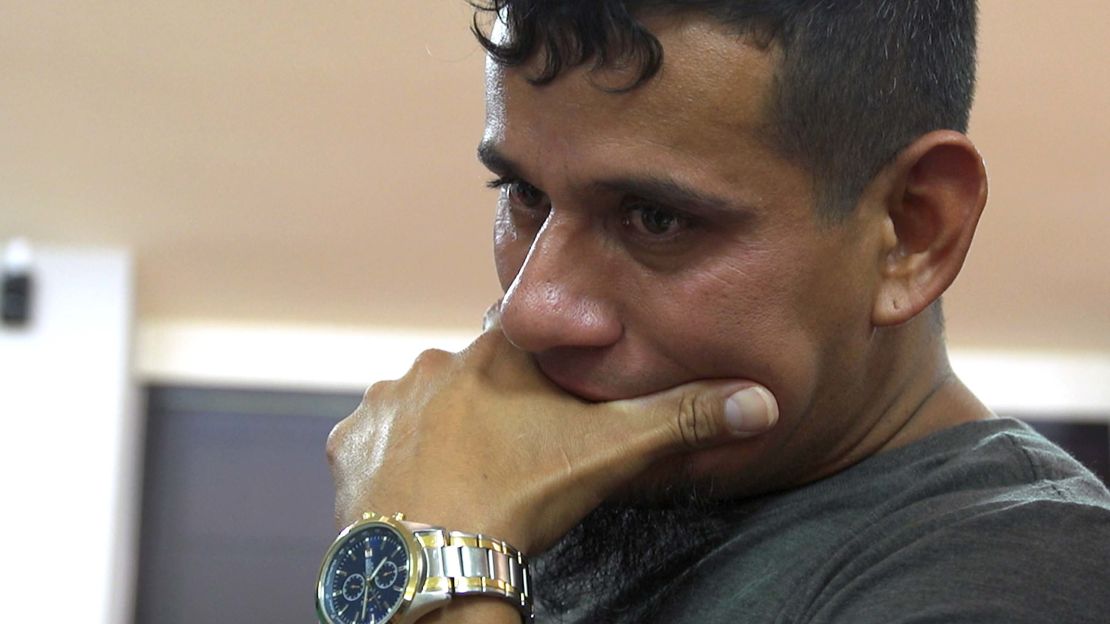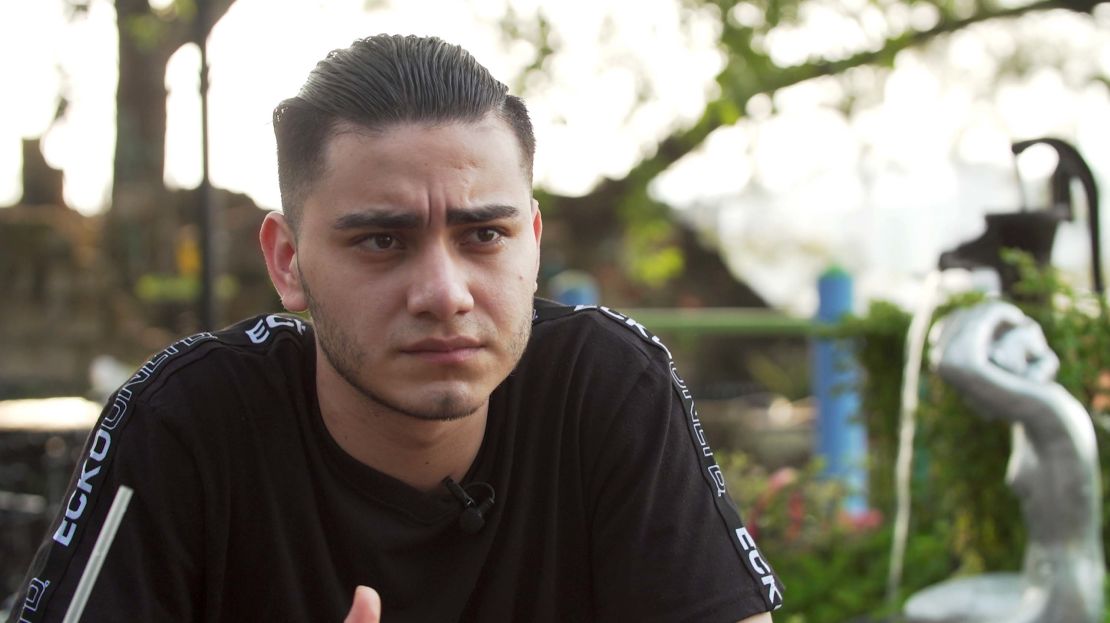They emerge blinking into the sun and tropical heat of a homeland some have not seen for over a decade.
They are grown men, torn from their families, some sweating still in the thick tracksuits given to them by United States deportation officials in order to bear the chill of the air-conditioned jets and coaches of their forced transportation.
Still dazed from the roughly 4,000-kilometer journey, they do not really know where they are, or what lies ahead. They must begin again from scratch.
This is what it is like to be a deportee in El Salvador: Dragged away from their lives in the US, in some cases told little about what is happening to them, having their appeals against deportation denied, leaving their children behind.

Earlier this year, US President Donald Trump ended Temporary Protected Status (TPS) for Salvadoran migrants, meaning 200,000 people from the country must leave the US by September 2019. Previously, TPS had allowed Salvadorans and immigrants from other specified disaster-stricken countries to have their resident permits renewed every 18 months.
But in January the Department of Homeland Security announced this would cease, partly as disaster conditions in El Salvador have improved enough to permit a return.
Critics say the new rules are part of a Trump administration bid to crack down even on legal migrants.
EXCLUSIVE: US-funded police linked to illegal executions
Easy prey for gangs
El Salvador is a particularly violent place to call home, where gangs such as the infamous MS-13 are said to prey upon the newly-deported. Even jobless deportees are still seen as coming from the more monied and privileged United States. The new arrivals are often unfamiliar with their fast-changing former home, making them easy targets for gangs.
But “home” isn’t back here anymore for many like Christian Lara. The 37-year-old hasn’t seen El Salvador for 20 years, after escaping the gang-ravaged capital San Salvador as a teenager.
He said he was picked up from outside his construction job in Florida, and following a deportation order in April was sent back to the crime-riddled Latin American country.

Lara was among the first off a bus of dozens of fresh deportees that pulled into the La Chacra repatriation center in San Salvador, located close to gang territory, one day in April.
He was in tears as he discussed the daughters he left behind in the US. They include Jennifer, age 12, and Angela, 3. “She’s my little baby,” he said, adding that he did not know when he would see his family again.
Lara faces a difficult choice. Either bring his young family away from the comforts of Florida to a country where someone is murdered every two hours, according to police, or raise the steep sum needed to pay smugglers to ferry him illegally back to the US.
‘How can I support my family on $5 a day?’
It is a choice made even harder by the paltry money Lara can expect to earn, most probably on a farm in his mother’s town, San Miguel, in the east of the country.
The $5 a day he earns there will barely be enough for him, let alone to send anything back to his wife and children.
“I have to work a lot to earn $5, but how can I support my family with only $5?” he said. “I can’t support them. But the immigration judges don’t care about that.”
Hours after arriving at the yellow concrete building located near a gang-run slum, Lara began a series of interviews with Salvadoran officials to try and work himself back into the tattered bureaucracy of a homeland where about 17% of gross domestic product is generated by remittances from Salvadorans working in other countries, according to the World Bank.
Now, the very people who inject a huge amount of money into El Salvador’s economy are instead being sent home to burden it.
The Immigration and Customs Enforcement (ICE) office in Miami told CNN that Lara was deported for immigration offenses, which suggests a more serious crime was not involved.
‘It’s scaring me, man’
Others, such as 20-year-old Oscar Morales Flores, are more complicated stories. He told CNN at first that he was deported after spending six months in jail after an altercation outside a Houston nightclub, when local men approached the girl he was with.

Harris County Sheriff’s office later told CNN that Flores had been arrested on April 5 last year and pled guilty to the charge of “assault with bodily injury.”
He was swiftly handed over to ICE in July of last year, spending a matter of weeks in jail for the assault, and then deported this April. Flores didn’t reply when CNN asked him about the assault conviction.
Back in San Salvador, Flores is nervous. Despite his fluency in Spanish and clothes bearing the default local sports brands, the young man is still clearly out of his element. He has heard of the gangs here – among them MS-13, whose members Trump has called “animals,” using their brutality to fuel fear and support for his broad anti-immigration agenda.
“When I was in the USA, I see the news like 16 people killed every day,” he said. “It’s scaring me, man. I called my mom, hey that’s true, man, the news is true? She told me ‘yeah – that’s why I don’t want you to come back to El Salvador.’”
Soon after arriving, Flores was already counting his money to get back to the US. He says he’ll need $8,000 to pay a “coyote” – a smuggler who can help him travel north through Guatemala and Mexico – to try and cross illegally back into the US.
For now, Flores’s biggest worry is the night ahead of him. He had to call his sister, Tatiana, who lives in a gang-controlled area of Mejicanos, north of the city. She was his only option on his first night back in El Salvador, and he was visibly nervous.
Four hours after Flores reached his sister’s home, he says members of MS-13 approached him.
The criminal gang started in Los Angeles in the 1980s, but has since spread across the Americas and is thought to have tens of thousands of core members in El Salvador.
“MS-13, they take my shirt down and I tell him what you doing?” Flores told CNN two days later, still visibly shaken. “‘I want to check if you got tattoos on your body,’ they said.” He continued to re-enact the conversation: “’Ok. I don’t have any tattoos on my body.’ Alright.”
“Man, I don’t want to live here,” said Flores, welling up. “I will be leaving here, man.”
There have been other challenges since returning, with an attempt to reunite with his father short-lived.
“He looked at me like I was sh**,” Flores said. “He said ‘Go away, man, I don’t want you to be here.’”
Planning their escape
In another part of the migration center, Lara sifted through his belongings from an ICE-issue mesh bag, re-laced his shoes, and explained his situation yet again to a Salvadoran official. Finally he walked out of the building into the arms of his mother, Rubi, and brother Josué, who had also been deported just months earlier.
It was a bittersweet moment of smiles and tears. Lara had not seen his mother in four years.
Two weeks later, his brother Josué told CNN that Lara was making his way to Guatemala to try to get smuggled back into the US again.
Josué said Lara raised the money needed to escape – often a feat involving precarious loans.
“Life in El Salvador is worse than I thought,” said Josué, adding that he has had problems with gangs since returning.
Marked for life
Young and dislocated men like Josue Lara and Oscar Morales Flores are prime targets for gangs. They are considered naive, vulnerable and comparatively wealthy for El Salvador, even though many of them came there with nothing.
When it all goes wrong, they end up in prisons that are often desperately overcrowded and at times rife with disease.
In one prison, Centro Penal de Apanteos in San Salvador, gang members displayed tattoos that mark them for life more firmly than the crimes they’re alleged to have carried out.
Among the prisoners is Edwin, who was in California when he got caught stealing and was then deported back to El Salvador. He was clear about what tattoos and gang life here means.
“In this country, just because you have tattoos, gangs automatically think you are a member of some gang or you have been part of some gang,” Edwin explained. “Here it is different. I mean, a little kid can take your life away. If you don’t talk to the gang, you are their enemy. And if you talk to them, they want you to be part of them.”

![Members of the Special Reaction Force, a combined army-police unit, participate in a presentation ceremony prior to their deployment to deal with gang violence in San Salvador, El Salvador April 20, 2016. REUTERS/Jose Cabezas (Newscom TagID: rtrlseven801281.jpg) [Photo via Newscom]](https://media.cnn.com/api/v1/images/stellar/prod/180528082816-04-el-salvador-srf-file.jpg?q=x_0,y_0,h_1688,w_2999,c_fill/h_144,w_256)
